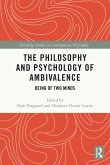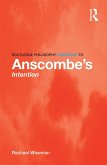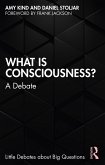The Philosophy and Psychology of Ambivalence (eBook, ePUB)
Being of Two Minds
Redaktion: Brogaard, Berit; Gatzia, Dimitria Electra
41,95 €
41,95 €
inkl. MwSt.
Sofort per Download lieferbar

21 °P sammeln
41,95 €
Als Download kaufen

41,95 €
inkl. MwSt.
Sofort per Download lieferbar

21 °P sammeln
Jetzt verschenken
Alle Infos zum eBook verschenken
41,95 €
inkl. MwSt.
Sofort per Download lieferbar
Alle Infos zum eBook verschenken

21 °P sammeln
The Philosophy and Psychology of Ambivalence (eBook, ePUB)
Being of Two Minds
Redaktion: Brogaard, Berit; Gatzia, Dimitria Electra
- Format: ePub
- Merkliste
- Auf die Merkliste
- Bewerten Bewerten
- Teilen
- Produkt teilen
- Produkterinnerung
- Produkterinnerung

Bitte loggen Sie sich zunächst in Ihr Kundenkonto ein oder registrieren Sie sich bei
bücher.de, um das eBook-Abo tolino select nutzen zu können.
Hier können Sie sich einloggen
Hier können Sie sich einloggen
Sie sind bereits eingeloggt. Klicken Sie auf 2. tolino select Abo, um fortzufahren.

Bitte loggen Sie sich zunächst in Ihr Kundenkonto ein oder registrieren Sie sich bei bücher.de, um das eBook-Abo tolino select nutzen zu können.
This book collects essays by top scholars that address questions about the nature, origins, and effects of ambivalence. It seeks to explain how ambivalence relates to philosophical topics such as agency, rationality, justification, knowledge, autonomy, self-governance, well-being, and social cognition.
- Geräte: eReader
- mit Kopierschutz
- eBook Hilfe
Andere Kunden interessierten sich auch für
![The Philosophy and Psychology of Ambivalence (eBook, PDF) The Philosophy and Psychology of Ambivalence (eBook, PDF)]() The Philosophy and Psychology of Ambivalence (eBook, PDF)41,95 €
The Philosophy and Psychology of Ambivalence (eBook, PDF)41,95 €![Propositional and Doxastic Justification (eBook, ePUB) Propositional and Doxastic Justification (eBook, ePUB)]() Propositional and Doxastic Justification (eBook, ePUB)41,95 €
Propositional and Doxastic Justification (eBook, ePUB)41,95 €![Practices of Truth in Philosophy (eBook, ePUB) Practices of Truth in Philosophy (eBook, ePUB)]() Practices of Truth in Philosophy (eBook, ePUB)42,95 €
Practices of Truth in Philosophy (eBook, ePUB)42,95 €![Routledge Philosophy GuideBook to Anscombe's Intention (eBook, ePUB) Routledge Philosophy GuideBook to Anscombe's Intention (eBook, ePUB)]() Rachael WisemanRoutledge Philosophy GuideBook to Anscombe's Intention (eBook, ePUB)25,95 €
Rachael WisemanRoutledge Philosophy GuideBook to Anscombe's Intention (eBook, ePUB)25,95 €![Responsibility for Rationality (eBook, ePUB) Responsibility for Rationality (eBook, ePUB)]() Sebastian SchmidtResponsibility for Rationality (eBook, ePUB)42,95 €
Sebastian SchmidtResponsibility for Rationality (eBook, ePUB)42,95 €![The Routledge Handbook of Philosophy of Skill and Expertise (eBook, ePUB) The Routledge Handbook of Philosophy of Skill and Expertise (eBook, ePUB)]() The Routledge Handbook of Philosophy of Skill and Expertise (eBook, ePUB)46,95 €
The Routledge Handbook of Philosophy of Skill and Expertise (eBook, ePUB)46,95 €![What is Consciousness? (eBook, ePUB) What is Consciousness? (eBook, ePUB)]() Amy KindWhat is Consciousness? (eBook, ePUB)33,95 €
Amy KindWhat is Consciousness? (eBook, ePUB)33,95 €-
-
-
This book collects essays by top scholars that address questions about the nature, origins, and effects of ambivalence. It seeks to explain how ambivalence relates to philosophical topics such as agency, rationality, justification, knowledge, autonomy, self-governance, well-being, and social cognition.
Dieser Download kann aus rechtlichen Gründen nur mit Rechnungsadresse in A, B, BG, CY, CZ, D, DK, EW, E, FIN, F, GR, HR, H, IRL, I, LT, L, LR, M, NL, PL, P, R, S, SLO, SK ausgeliefert werden.
Produktdetails
- Produktdetails
- Verlag: Taylor & Francis eBooks
- Seitenzahl: 336
- Erscheinungstermin: 22. Dezember 2020
- Englisch
- ISBN-13: 9780429638596
- Artikelnr.: 60467625
- Verlag: Taylor & Francis eBooks
- Seitenzahl: 336
- Erscheinungstermin: 22. Dezember 2020
- Englisch
- ISBN-13: 9780429638596
- Artikelnr.: 60467625
- Herstellerkennzeichnung Die Herstellerinformationen sind derzeit nicht verfügbar.
Berit Brogaard is Professor of Philosophy and Cooper Fellow at the University of Miami. Her areas of research include philosophy of perception, philosophy of emotions, and philosophy of language. She is the author of Transient Truths (Oxford University Press, 2012), On Romantic Love (Oxford University Press, 2015), The Superhuman Mind (Penguin, 2015), Seeing & Saying (Oxford University Press, 2018), and Hate: Understanding Our Most Dangerous Emotion (Oxford University Press, 2020). Dimitria Electra Gatzia is Professor and Chair of the Department of Philosophy at the University of Akron. She received a Research Fellowship at the Centre of Philosophy Psychology at the University of Antwerp (2016-2017) and a Research Fellowship at the Czech Academy of Sciences, Institute of Philosophy (Summer 2020). She has published numerous scholarly and popular articles on perception, consciousness, cognitive penetration, synesthesia, imagination, and physics. She is the co-editor (with Berit Brogaard) of The Epistemology of Non-visual Perception (Oxford University Press, 2020).
1. The Philosophical and Psychological Significance of Ambivalence: An
Introduction
Brit Brogaard and Dimitria Electra Gatzia
Part I: Ambivalence, Rationality, and Truth
2. Ambivalence, Incoherence, and Self-Governance
John Brunero
3. Ambivalence-Autonomy Compatibilism
J. S. (Jenny) Blumenthal-Barby
4. Irrationality, Charity, and Ambivalence
Eric Wiland
5. Rational Epistemic Akrasia for the Ambivalent Pragmatist
Neil Sinhababu
6. Ambivalence, Uncertainty, and Modality
Barry Lam and Brett Sherman
7. Epistemic Vertigo
Duncan Pritchard
Part II: Ambivalence, Emotions, and Intentionality
8. Fitting Inconsistency and Reasonable Irresolution
Simon D. Feldman and Allan Hazlett
9. Self-Hatred, Self-Acceptance, and Self-Love
Katy Abramson and Adam Leite
10. To Express or not to Express: Ambivalence about Emotional Expressions
Trip Glazer
11. Intentionalism, Ambivalent Emotions, and the Body
Kathryn Pendoley and Sarah Arnaud
Part III: Ambivalence, Racism, and Global Justice
12. Cognitive Dissonance and the Logic of Racism
Berit Brogaard and Dimitria Electra Gatzia
13. The Body Politic Is of Two Minds: Political Ambivalence on Norms of
Justice
Jill Delston
Part IV: Ambivalence, Well-Being, and Subjectivity
14. Ambivalence, Well-being, and Prudential Rationality
Jason R. Raibley
15. Bridling the Mindless Ambivalence: Langerian Mindfulness and Suspension
of Intentionality
Sayyed Mohsen Fatemi and Ellen Langer
16. Ambivalence and the Borderline Position in the
Existential-Phenomenology of Merleau-Ponty: On Being and Having a
Body-in-the-World from Primal Ambivalence to Intersubjective Ambiguity
Frank Scalambrino
Introduction
Brit Brogaard and Dimitria Electra Gatzia
Part I: Ambivalence, Rationality, and Truth
2. Ambivalence, Incoherence, and Self-Governance
John Brunero
3. Ambivalence-Autonomy Compatibilism
J. S. (Jenny) Blumenthal-Barby
4. Irrationality, Charity, and Ambivalence
Eric Wiland
5. Rational Epistemic Akrasia for the Ambivalent Pragmatist
Neil Sinhababu
6. Ambivalence, Uncertainty, and Modality
Barry Lam and Brett Sherman
7. Epistemic Vertigo
Duncan Pritchard
Part II: Ambivalence, Emotions, and Intentionality
8. Fitting Inconsistency and Reasonable Irresolution
Simon D. Feldman and Allan Hazlett
9. Self-Hatred, Self-Acceptance, and Self-Love
Katy Abramson and Adam Leite
10. To Express or not to Express: Ambivalence about Emotional Expressions
Trip Glazer
11. Intentionalism, Ambivalent Emotions, and the Body
Kathryn Pendoley and Sarah Arnaud
Part III: Ambivalence, Racism, and Global Justice
12. Cognitive Dissonance and the Logic of Racism
Berit Brogaard and Dimitria Electra Gatzia
13. The Body Politic Is of Two Minds: Political Ambivalence on Norms of
Justice
Jill Delston
Part IV: Ambivalence, Well-Being, and Subjectivity
14. Ambivalence, Well-being, and Prudential Rationality
Jason R. Raibley
15. Bridling the Mindless Ambivalence: Langerian Mindfulness and Suspension
of Intentionality
Sayyed Mohsen Fatemi and Ellen Langer
16. Ambivalence and the Borderline Position in the
Existential-Phenomenology of Merleau-Ponty: On Being and Having a
Body-in-the-World from Primal Ambivalence to Intersubjective Ambiguity
Frank Scalambrino
1. The Philosophical and Psychological Significance of Ambivalence: An
Introduction
Brit Brogaard and Dimitria Electra Gatzia
Part I: Ambivalence, Rationality, and Truth
2. Ambivalence, Incoherence, and Self-Governance
John Brunero
3. Ambivalence-Autonomy Compatibilism
J. S. (Jenny) Blumenthal-Barby
4. Irrationality, Charity, and Ambivalence
Eric Wiland
5. Rational Epistemic Akrasia for the Ambivalent Pragmatist
Neil Sinhababu
6. Ambivalence, Uncertainty, and Modality
Barry Lam and Brett Sherman
7. Epistemic Vertigo
Duncan Pritchard
Part II: Ambivalence, Emotions, and Intentionality
8. Fitting Inconsistency and Reasonable Irresolution
Simon D. Feldman and Allan Hazlett
9. Self-Hatred, Self-Acceptance, and Self-Love
Katy Abramson and Adam Leite
10. To Express or not to Express: Ambivalence about Emotional Expressions
Trip Glazer
11. Intentionalism, Ambivalent Emotions, and the Body
Kathryn Pendoley and Sarah Arnaud
Part III: Ambivalence, Racism, and Global Justice
12. Cognitive Dissonance and the Logic of Racism
Berit Brogaard and Dimitria Electra Gatzia
13. The Body Politic Is of Two Minds: Political Ambivalence on Norms of
Justice
Jill Delston
Part IV: Ambivalence, Well-Being, and Subjectivity
14. Ambivalence, Well-being, and Prudential Rationality
Jason R. Raibley
15. Bridling the Mindless Ambivalence: Langerian Mindfulness and Suspension
of Intentionality
Sayyed Mohsen Fatemi and Ellen Langer
16. Ambivalence and the Borderline Position in the
Existential-Phenomenology of Merleau-Ponty: On Being and Having a
Body-in-the-World from Primal Ambivalence to Intersubjective Ambiguity
Frank Scalambrino
Introduction
Brit Brogaard and Dimitria Electra Gatzia
Part I: Ambivalence, Rationality, and Truth
2. Ambivalence, Incoherence, and Self-Governance
John Brunero
3. Ambivalence-Autonomy Compatibilism
J. S. (Jenny) Blumenthal-Barby
4. Irrationality, Charity, and Ambivalence
Eric Wiland
5. Rational Epistemic Akrasia for the Ambivalent Pragmatist
Neil Sinhababu
6. Ambivalence, Uncertainty, and Modality
Barry Lam and Brett Sherman
7. Epistemic Vertigo
Duncan Pritchard
Part II: Ambivalence, Emotions, and Intentionality
8. Fitting Inconsistency and Reasonable Irresolution
Simon D. Feldman and Allan Hazlett
9. Self-Hatred, Self-Acceptance, and Self-Love
Katy Abramson and Adam Leite
10. To Express or not to Express: Ambivalence about Emotional Expressions
Trip Glazer
11. Intentionalism, Ambivalent Emotions, and the Body
Kathryn Pendoley and Sarah Arnaud
Part III: Ambivalence, Racism, and Global Justice
12. Cognitive Dissonance and the Logic of Racism
Berit Brogaard and Dimitria Electra Gatzia
13. The Body Politic Is of Two Minds: Political Ambivalence on Norms of
Justice
Jill Delston
Part IV: Ambivalence, Well-Being, and Subjectivity
14. Ambivalence, Well-being, and Prudential Rationality
Jason R. Raibley
15. Bridling the Mindless Ambivalence: Langerian Mindfulness and Suspension
of Intentionality
Sayyed Mohsen Fatemi and Ellen Langer
16. Ambivalence and the Borderline Position in the
Existential-Phenomenology of Merleau-Ponty: On Being and Having a
Body-in-the-World from Primal Ambivalence to Intersubjective Ambiguity
Frank Scalambrino







